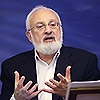Audio Version Of The Blog – 12/28/23
Listen to an Audio Version of the Blog
Download:MP3 Audio

Listen to an Audio Version of the Blog
Download:MP3 Audio

Michael Laitman on the Times of Israel: “The Emergence of the Spiritual Land of Israel in the Heart”
In recent months, Israel has been a land filled with expressions of both brotherly love and selfish struggles, playing host to a constant conflict between goodwill and animosity.
According to the wisdom of Kabbalah, “land” (Heb. “Eretz”) means “desire” (Heb. “Ratzon”), which is also referred to as man’s heart. In this desire—heart—resides the people of Israel and the nations of the world. These desires, however, like neighbors, struggle to coexist peacefully: either the nations dominate or the people of Israel prevail in the heart.
Initially, the heart was like a wilderness, controlled solely by self-serving desires, which consumed everything within their grasp. Kabbalah defines the self-serving desires as “the nations of the world.”
As humanity evolved, a small desire emerged called “Israel,” which stems from the words “straight to God” (Heb. “Yashar El”). Kabbalah usually refers to God as “the Creator,” and defines it as the quality of love and bestowal that creates and sustains the universe, including us humans. In other words, we initially develop as the nations of the world, i.e., in self-serving desires that make us prioritize personal benefit over benefiting others and nature, and the desire called “Israel,” which means a desire to benefit others and nature, emerges in us at a later evolutionary stage.
Conflict erupted when the desire called “Israel” emerged among the desires called “the nations of the world.” We started fighting with ourselves in order to overcome the heart, to relinquish control from the selfish will and let the higher power of love and bestowal guide us and reshape our heart.
This inner battle persists until efforts to overpower selfishness tip the scales, granting victory to the upper Divine will, letting love and bestowal rule over the heart. With this triumph, the heart becomes “the Land of Israel,” as it then gains the intention to be aimed “Yashar El” (“straight to God”).
The means to achieve this devotion to the Divine will is in the people who share the initial desire to reach a state of mutual love and bestowal among all people, and who are willing to support and encourage each other to combat their self-serving nature. Through the amplification of such an influence, these people come to reach a state of “love your neighbor as yourself” as they let the quality of love and bestowal guide their hearts at every front. When they reach this state of utmost harmony, the entire Land of Israel within will emerge in its purity and sanctity, dedicated completely to the upper force of love and bestowal—to God.
[322789]
Hello! My neighbor Irina is studying Kabbalah with you. She sent me a quote yesterday. She knows that my husband and I are having difficulties, to put it mildly, and wants to help us. So, I decided to write to you. The quote is as follows:
“’Therefore a man shall leave his father and his mother and hold fast to his wife, and they shall become one flesh.’ That is, this one is worthy of being dedicated to the man, and the man is dedicated to her.
“Therefore, a man should love his wife as his own body and respect her more than his own body, have compassion for her and cherish her as one cherishes one of his own organs. And she, too, must respect and love him as her soul, for it is from him that she was taken” (Rabbi Abraham Ben David, Baalei HaNefesh).
I looked at Wikipedia, this is a Jewish sage. He lived in the 12th century. Tell me, is this suitable for us today, the way we are? Or is it only for the 12th century?
My Response: I think this attitude is more or less suitable at all times.
Question: Then she asks: “Explain what it means to hold fast to his wife and become one flesh?”
Answer: To take care of her. The way you take care of yourself, take care of her.
Question: This passage from the Torah says: a man will leave his father and his mother and hold fast to his wife, and they shall become one flesh. That is, he will already care for his wife. Is this called “to hold fast”?
Answer: Yes.
Question: The second question is: what does it mean that we should be dedicated to each other? The word “dedicated,” what is it? Is this fate? What is it about?
Answer: Of course, this is fate. You see how people get closer to each other, get to know each other, how they gradually feel that they are good together. This is called “dedicated.”
Question: Is there some kind of hand in this that brings people together?
Answer: Of course.
Question: Do they not just meet by chance?
Answer: No. There is no chance at all.
Question: Is this what is called “dedicated”?
Answer: Yes.
Question: Next, she asks: “What does it mean “must love as oneself”? It sounds like an order that I am obliged to do this. Is it possible to oblige a person to do this?”
Answer: A man and a woman should see this goal before them: to love the life partner and companion so that they take care of him or her as of themselves. At least as much as possible. Both he and she have this task.
Question: “What does it mean that I should respect and love him as my soul? I don’t even know where my soul is, or if I love it at all. What does it mean to love like my soul?”
Answer: Like your life.
Question: One more question: “What does it mean that I, a wife, am taken from my husband? It is written, for it is from him that she was taken.
Answer: It is believed that a woman who lives with a man, as it were, becomes a part of him. It is called that she is taken from him.
Question: Her last question is: “In general, how to live together without getting divorced?”
Answer: It depends on people, and how seriously they take life. If they feel responsible to their children, and for each other, then they will manage.
Question: You know, today divorces take place all over the world.
Answer: I do not understand this because I believe that there should be no divorces.
Comment: You see, it is not for nothing that her first question was: “Does this apply to the sage of the 12th century or to us too?”
My Response: I think it does not matter what time it belongs to, but there should not be any divorces in general.
Comment: This is not the first time you have said this. Do you know what the comments are about this? “What if he is like that? What if she is like that? What if he drinks? What if he beats me?” And so on, a lot of them.
My Response: I cannot comment on all these screams, but I believe that there is still no place for divorce. Especially for the sake of children. It always hurts a lot.
Question: When you say that, do you mean a family that has children?
Answer: Otherwise, it is not a family, between you and me.
Question: Do you not mean that if it does not work out?
Answer: If there are any problems, it was already there initially.
Question: In principle, if they have children are they a family?
Answer: Yes.
Question: Can you suggest some kind of exercise for people who are in a state of anxiety: “What if it happens? What if we get divorced? We are moving toward this; we are getting closer to this.” What should they do? How can they sit down together and talk?
Answer: This is a problem and a long period of re-education. I think this is not easy. But still, divorce is the very last and, I would say, unacceptable step. This is something that cannot be crossed.
Question: If this enters into them, if they somehow absorb this into themselves, will this allow them to begin getting closer to each other from this moment on?
Answer: Yes. That is, it is important to discover and work with the point that there can be no divorces.
[322021]
From KabTV’s “News with Dr. Michael Laitman” 11/20/23
Related Material:
When Family Becomes a Family
Why Does A Man Need A Woman?
An Ideal Family
 Hence, one needs to pray pleadingly that the Creator will show him the truth by adding to him the light of the Torah (Baal HaSulam, Shamati 47 “In the Place Where You Find His Greatness”).
Hence, one needs to pray pleadingly that the Creator will show him the truth by adding to him the light of the Torah (Baal HaSulam, Shamati 47 “In the Place Where You Find His Greatness”).
Question: It turns out that a person asks the Creator to reveal the truth to him, meaning, his evil inclination. This is a prayer from the left line. Is such a prayer correct?
Answer: No, we must ask the Creator to reveal the truth to us and shed light on our present state.
We need to relate all states, whatever they may be, to the Creator and try to see through them how the Creator wants to bring us closer to Him.
We need to reveal a constant connection with the Creator. That is what we have to think about and ask for.
[322291]
From the Daily Kabbalah Lesson 12/15/23, Writings of Baal HaSulam “In the Place Where You Find His Greatness”
Related Material:
Pray Every Day
What To Ask The Creator
What And How To Ask The Creator
 Question: A big dog saw a puppy chasing its tail. The dog asked: “Why are you chasing the tail?” The puppy replied: “I have already studied philosophy, solved the problems of the universe, and I have learned that the best thing for a dog is happiness. And my happiness is in the tail. When I catch it, it will be mine.”
Question: A big dog saw a puppy chasing its tail. The dog asked: “Why are you chasing the tail?” The puppy replied: “I have already studied philosophy, solved the problems of the universe, and I have learned that the best thing for a dog is happiness. And my happiness is in the tail. When I catch it, it will be mine.”
“Son,” said the dog, “I was also interested in world problems and also realized that my happiness is in the tail. But I noticed that wherever I go, whatever I do, the tail follows me.”
The question is this. We are chasing happiness. And it turns out to be nearby all the time, here, it is following me. Do you agree with this?
Answer: Yes.
Question: What is it, can we tell? How can I see it?
Answer: Understand that you do not have to run after it or chase it; happiness is near or even behind you.
Question: Are we in a hurry to acquire knowledge, to acquire everything, and that’s it?
Answer: Don’t chase anything. What for?
Question: But it gives some kind of pleasure to a person.
Answer: You do not have to run anywhere, but you will find pleasure in the fact that you just live quietly.
Question: Is this happiness?
Answer: Yes, it is.
Question: What do you imply by living quietly?
Answer: That I do not have any special goals, especially unattainable ones, but I live in order to live, to live this life in peace.
Question: But how can you live without goals? You have been coming back to this a lot lately in our conversations.
Answer: Yes, because life is like that. It clearly shows us: do not ask too much of it. And all that you have, be satisfied calmly and show this example to others.
Question: That is how you live?
Answer: Yes.
[321772]
From KabTV’s “News with Dr. Michael Laitman” 11/13/23
Related Material:
Care That All Will Be Happy
Looking For Happiness Or Simply Living?
What Separates Us From Happiness?
 Question: Generally a person can see that something influences him, but does not understand how it influences him. He is unable to predict what will happen to him in a minute, two minutes, or three minutes.
Question: Generally a person can see that something influences him, but does not understand how it influences him. He is unable to predict what will happen to him in a minute, two minutes, or three minutes.
What should his correct attitude be to these concealed factors so he can advance according to the path destined for him?
Answer: A person should understand that he is moving instinctively according to nature’s impulses.
There is nothing else he can offer himself. This is the sober approach. It is impossible to say that it is better or worse; it is merely what we have.
Question: How can we increase the efficiency of this path? It may be impossible and it should be enough to approach life soberly.
Answer: I cannot imagine how we can determine the efficiency factor of our development. Today, it practically leads us to mutual destruction. Therefore the efficiency factor here is negative.
Question: If we take a group of people united around some principle, idea, or similarity, can this group have its own attitude to the concealed factors in development? Is it possible to talk about a group of people as an individual who develops, makes decisions, and perceives something?
Answer: If we take a group of scientists who are interconnected and set certain tasks in front of them, then we can certainly look at them as one person who is aspiring to achieve something.
However, if we are talking about humanity, it has not entered that level when it has a clearly defined task that all people would want to solve, regardless of their social organization.
[321926]
From KabTV’s “Kabbalah Express” 11/27/23
Related Material:
Concealed Because It Is Not Needed
Under A Press Or In The Incubator?
Time Is a Change of States
 Question: In the exact sciences, there is such a thing as an unsolvable problem when scientists prove that something cannot be solved. For example in astronomy, there is a three-body problem that cannot be solved in general, only regarding specific cases. Or the task of stopping a problem where it is proven that cannot be solved algorithmically.
Question: In the exact sciences, there is such a thing as an unsolvable problem when scientists prove that something cannot be solved. For example in astronomy, there is a three-body problem that cannot be solved in general, only regarding specific cases. Or the task of stopping a problem where it is proven that cannot be solved algorithmically.
Is this right or wrong? Are there problems that cannot be solved at any level? Or are these all specific cases?
Answer: I would say, these are tasks that a person sets for himself, based on the limitations of his knowledge and conclusions. Therefore, we cannot say that nature is, in principle, unknowable. We can only say that we cannot yet know it.
But we do not say that this is completely closed to people. After all, in the past, people thought this way about some objects and the boundaries of knowledge, and then this began to be revealed more and more at the macro and micro levels. We have a little data at our disposal to assert there is a clear limit to our knowledge.
Question: Will a person always strive for knowledge, or can this desire disappear in him?
Answer: I think he always will. There will be ups, downs, and all kinds of periods in development, as the history of mankind proves. But, in general, the process of cognition is a process of filling oneself, and it is limitless.
[321874]
From KabTV’s “Kabbalah Express” 11/27/23
Related Material:
Final Correction
The Evolution Of Desires
The Way To The Final Correction
 Question: Where is the low place where the Creator is hiding?
Question: Where is the low place where the Creator is hiding?
Answer: The Creator hides between friends where there is some kind of mismatch between them.
Question: When I have already prayed for my friends, for the Creator, and for Him to advance us, what else can I pray for?
Answer: You can pray for you to get closer to your friends and through them to the Creator.
Question: What is annulment in desires, intentions, and actions?
Answer: Annulment means that I don’t want anything for myself, but I really want to get closer to the Creator and fill everyone with love.
Question: What is more important in the search for connection with the Creator and His greatness: paying attention to what is revealed through the inner circle in the group, or to internal states, thoughts and feelings?
Answer: Whatever is revealed in the connection between friends.
[322285]
From the Daily Kabbalah Lesson 12/15/23, Writings of Baal HaSulam “In the Place Where You Find His Greatness“
Related Material:
Questions about Spiritual Work—46
Questions about Spiritual Work—45
Questions about Spiritual Work—44
 Question: A man saw in a dream that the king is in heaven and the sage is in hell. He asked the Creator, “What is the reason for this? I thought it would be the opposite, that the king would be in hell and the sage in heaven.” And he received the answer: “This king was accepted into heaven for his attachment to the sages. And the sage was sent to hell for his closeness to the kings.”
Question: A man saw in a dream that the king is in heaven and the sage is in hell. He asked the Creator, “What is the reason for this? I thought it would be the opposite, that the king would be in hell and the sage in heaven.” And he received the answer: “This king was accepted into heaven for his attachment to the sages. And the sage was sent to hell for his closeness to the kings.”
The question is, what qualities should a ruler possess in order to bring sages closer to himself, and not politicians?
Answer: He must have great respect for sages. The most important thing in his life is that he must understand that he needs to surround himself with sages.
Question: What do you mean by the word “sage”?
Answer: It is a person who strives to understand the meaning of life.
Question: Is this a sage? So for a ruler who has to take care of the people, security, the economy, etc., the main thing is to surround himself with those who talk about the meaning of life and think about it?
Answer: Yes, and then everything will work out.
Comment: In principle, for us it all stopped with the king-sages who embodied wisdom themselves: King David, King Solomon…
My Response: Oh, those were the first colossuses! They embodied wisdom themselves and surrounded themselves with sages.
Question: Should the ruler be like that today?
Answer: It is ridiculous to assume that. But in general, yes.
Question: The sage was sent to hell because he was too close to the rulers. There is some kind of contradiction here. How can a sage not bend under the power of the rulers?
Answer: He must be independent. Absolutely! Independent from everyone! And then the rulers will listen to the sages. That is, the independence of the sage will attract the ruler to him.
Question: That sage who ended up in hell, did it turn out that he was not very wise?
Answer: Of course, he bent under the ruler.
Question: What is the conclusion? What is a true ruler and what is a true sage?
Answer: A true sage is one who prefers wisdom to any other attributes and places it above everything else. And a true ruler is the one who bows down to the wisdom of the sages and places them above all.
Question: Beautiful! This view that professionals should be in power—economic professionals, security professionals, political professionals—in your opinion, is this view incorrect?
Answer: No, they are pulling humanity in absolutely the wrong direction.
[321877]
From KabTV’s “News with Dr. Michael Laitman” 11/9/23
Related Material:
Only A Sage Can Recognize A Sage
Faith In The Sages
An Unhappy Sage
 Question: What can we learn by checking whether the Creator loves us before we appeal to Him?
Question: What can we learn by checking whether the Creator loves us before we appeal to Him?
Answer: This is not even a test because we must constantly be sure that He loves us.
The Creator has no other attitude toward us because everything He does to us comes from absolute love.
[322295]
From the 1st part of the Daily Kabbalah Lesson 12/15/23, Writings of Rabash “What Does It Mean that Oil Is Called “Good Deeds” in the Work?”
Related Material:
How Can We Feel The Creator Loves Us?
To Not Lose Touch With The Creator
In the Ocean of the Creator’s Love